"My C drive (the drive on which I installed the Windows 10 OS) is getting full for no reason. I tried system file cleanup and emptying the Recycle Bin, but nothing changed. What should I do?"
Many people have reported that their C drive is suddenly full. They couldn't figure out why and didn't know what to delete. If you have the same problem, it is first recommended that you do not install too much software on the C drive and uninstall unnecessary software. Then, continue reading this page. We will show you six effective ways to fix the problem that the C drive is full for no reason in Windows 10.
When your C drive is full without reason, it is still recommended that you run Disk Cleanup to clean up your C drive before performing any further actions.
Step 1: Right click on your C drive and select Properties.
Step 2: When the Properties dialog opens, click the Disk Cleanup button.
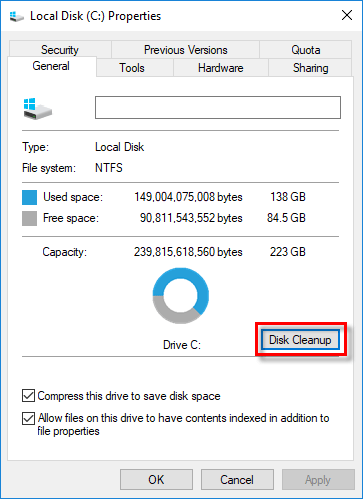
Step 3: After the Disk Cleanup is opened, select the file types that are taking up a lot of space on your C drive, including previous Windows installation, system restore points, Recycle Bin, Temporary files, etc., and then click OK to clean them all. Typically, this helps you free up at least a few gigabytes or more of free space on your C drive. However, if this doesn't help you much, read on for more solutions.
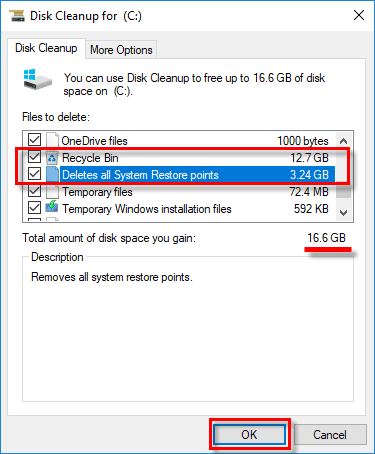
Virus and malware may constantly generate files to fill your hard drive. Therefore, when the C drive is getting full for no reason, malware or virus infection is a factor to consider. You can scan your computer from Windows Defender or any other antivirus software you are using. Once a malware or virus is found, remove it so that your problem can be resolved.
If no malware or virus is found, check your C drive for file system errors that might cause your hard drive to show a wrong disk usage.
Step 1: Type cmd in the search box next to the Windows icon and then press Enter. This will open the Command Prompt.

Step 2: In the Command Prompt window, type chkdsk C: /f /v /x and press Enter. This will start checking your C drive for errors and fixing them.

If it does not start checking disk errors but instead shows the following message, type Y and hit Enter, so it will start checking your C drive the next time your Windows 10 restarts.
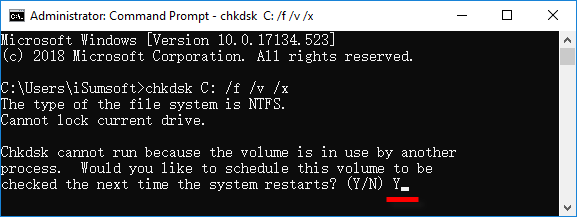
For laptops, the Hibernation file is often the culprit that cause the C drive to be full, because it needs to be as big as the amount of RAM and can only live on the C drive (can't move it to another data drive).
Step 1: Type folder options in the search box next to the Windows icon. When the File Explorer Options appears in the result list, click on it to open the File Explorer Options window.
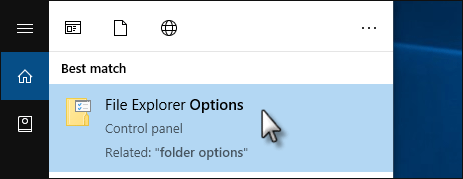
Step 2: Select the View tab. Check the Show hidden files, folders and drives box, uncheck the Hide protected operating system files (Recommended) box, and then click Apply. This will show the Hibernation file which is hidden by default.
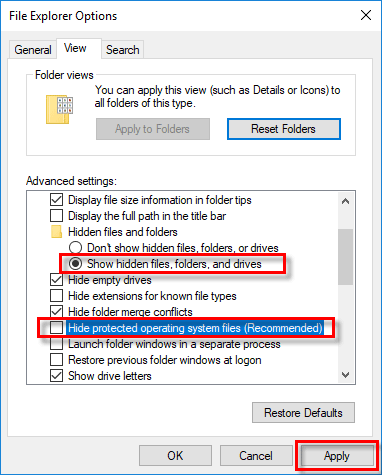
Step 3: Open your C drive in File Explorer and now you can find the Hibernation file (hiberfil.sys) under the root directory of the C drive. Right click on the hiberfil.sys file and select Properties to check how much space it is taking up on your disk.
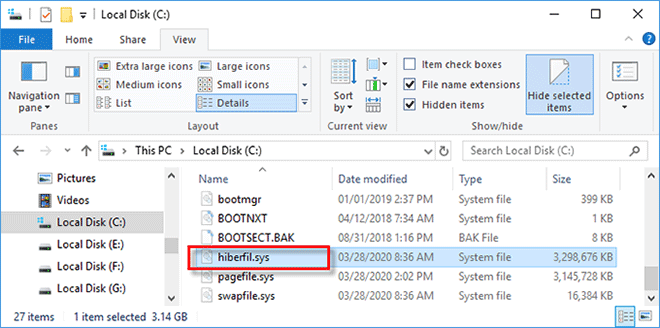
Step 4: Delete the hiberfil.sys file if it is taking up vast quantities of space. This will free up at least a few gigabytes of space on your nearly full C drive.
You may have saved large files to the C drive that you are not aware of. In addition, sometimes, if a program is behaving badly, it may make an infinitely increasing file until your C drive is full.
Step 1: Open your C drive in File Explorer and make sure the Hidden items box under the View tab is checked.
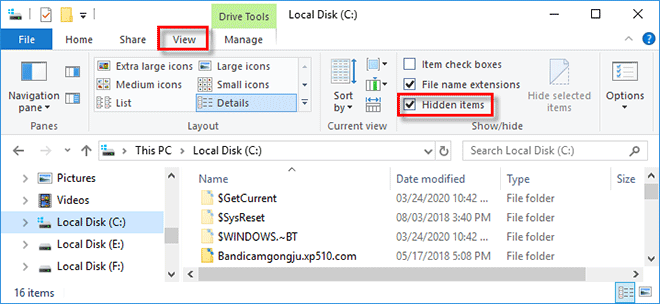
Step 2: Type size:gigantic in the search box in the upper right corner. File Explorer will search all giant files on your C drive. When the searching is complete, you can get a better idea of what files are taking up most space and causing your C drive to be full.
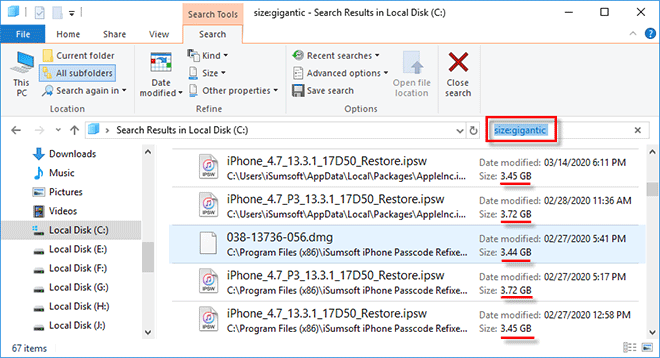
Step 2: Delete those unwanted huge files and empty the Recycle Bin. Or, move the large files to another data drive if you still need them. After that, you should see a few more gigabytes of free space on your C drive.
If you have tried all the preceding methods but the problem that the C drive is full still hasn't been solved, then some unnecessary system files may still be the main cause of this problem. If running Disk Cleanup isn't much help, it is a good choice to use a more advanced system cleaning tool to scan your C drive deeply. iSumsoft System Refixer is one such tool, which can scan your C drive deeply to find all unnecessary files created by the system and other programs, and then let you clean them all with one click.
Step 1: Download and install iSumsoft System Refixer on your Windows 10. After installation, launch this tool.
Step 2: Select the Clean All option and then click the Scan button. This will perform a full scan of your C drive.
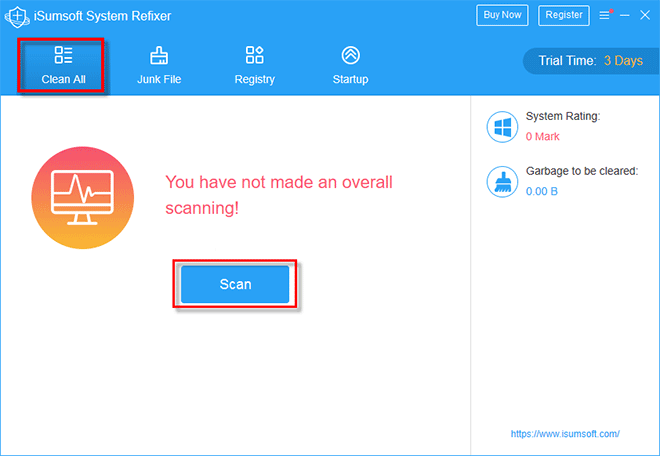
Step 3: When the scan is complete, all unnecessary files are displayed on the screen. Click the Clean button to clean them all. After that, your nearly full C drive should get a lot of free space.
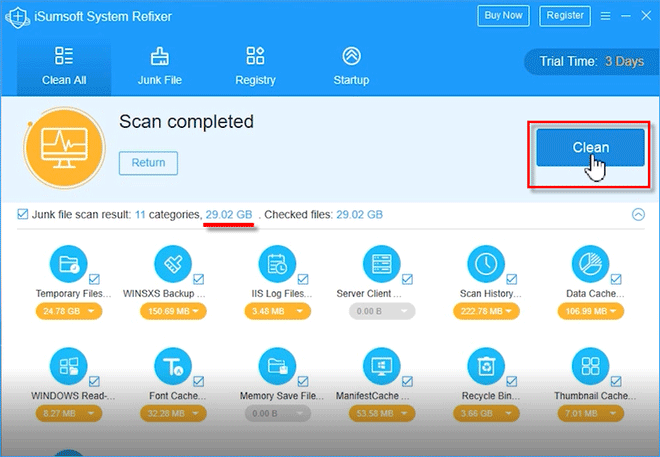
The above are all the effective methods to solve the problem that the C drive is full for no reason in Windows 10. I believe at least one way works for you. Of course, sometimes it may take a combination of methods to get the problem resolved. However, if you have tried all of these methods and the problem has not been effectively solved, then reinstalling the Windows 10 or extending your C drive will be the final solution.